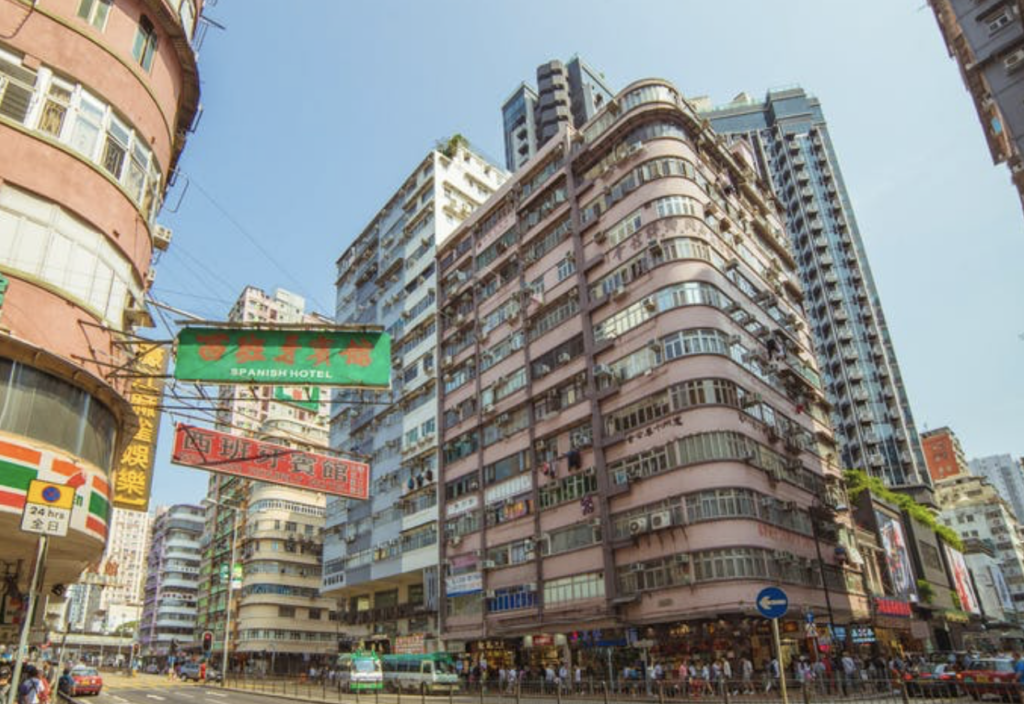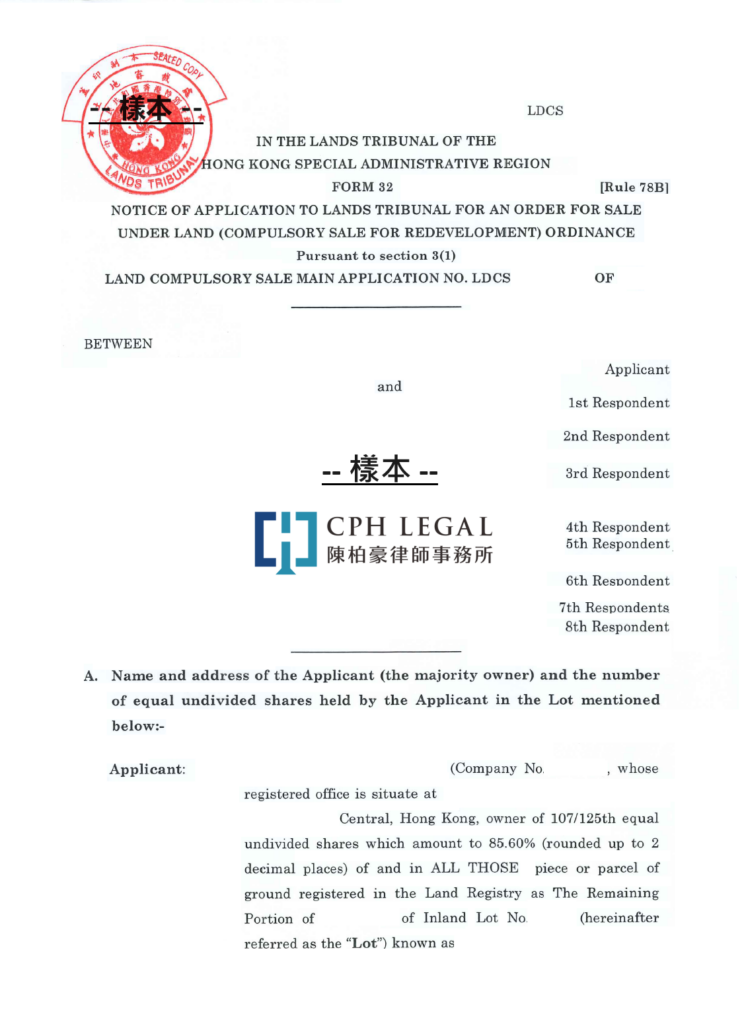
Hong Kong has undergone significant development over the past century. In the decades following World War II, the economy experienced tremendous growth, resulting in the construction of numerous buildings.
Many of these building structures have now reached the age of 50 years or older, and many of them have been poorly maintained, posing a threat to the safety of both residents and pedestrians.
These older buildings typically have fewer stories, and given the high population density of Hong Kong, there is a strong incentive for their demolition and redevelopment.
According to the Land (Compulsory Sale for Redevelopment) Ordinance (Cap. 545), developers or majority owners who hold between 80% and 90% of the undivided shares in a property are eligible to make an application for an order of compulsory sale to the Lands Tribunal.
When a majority owner files an application with the Lands Tribunal under Section 3(1) of the Land (Compulsory Sale for Redevelopment) Ordinance to apply for a compulsory sale of the lot, the majority owner will serve a "Notice of Application" on the minority owners. The minority owners will then be subject to various deadlines, and need to file a "Notice of Opposition" and other documents within those deadlines.
The "Notice of Application" is usually written entirely in English, accompanied by the Valuation Report of the Applicant ie. the majority owner. It is often a thick and bulky stack of documents. The "Notice of Application" is usually delivered to the mailbox of the property subject to the compulsory sale application, or directly posted on its door, in order to notify the minority owners.
As a minority owner, if you have already rented out your property, you should remind your tenant to be alert for any court documents, and require the tenant to promptly bring to your attention the court documents for follow-up, so as not to delay your defence in the compulsory sale proceedings.

Can I object to an order for compulsory sale?
When the Lands Tribunal determines whether an order for compulsory sale should be granted, according to Section 4(2)(a) of the Land (Compulsory Sale for Redevelopment) Ordinance, they consider the age and state of repair of the building to decide whether it should be redeveloped. The majority owner, the applicant, must prove that they have taken reasonable steps yet failed to acquire the remaining shares.
In regards to the state of repair, evidence from an expert witness is typically presented to the court by the majority owner. Common evidence includes reports from building surveyors or structural engineers, which detail the deterioration and defects that affect the structural safety of the buildings and, if repairs are necessary, the exorbitant cost. As the respondent, minority owners are entitled to provide evidence from an expert witness to prove the structural safety of the buildings, and as residents, minority owners may also provide factual evidence.
Furthermore, majority owners are responsible for taking reasonable steps to acquire the remaining shares from minority owners, including offering a fair and reasonable acquisition offer.
If the majority owner is unable to convince the court that the building is in need of redevelopment or that they have taken reasonable steps to acquire remaining shares, the Lands Tribunal may refuse the compulsory sale order.
Can I contest the acquisition price set by the majority owner?
As per the Land (Compulsory Sale for Redevelopment) Ordinance (Cap. 545), prior to submitting an application for a Compulsory Sale Order, the majority owner must engage a surveyor to prepare a Valuation Report. This report must include the Existing Use Value (EUV) of each apartment, as well as an estimated Redevelopment Value (RDV) to be included in the formal application to the Lands Tribunal and provided to the minority owners. If a compulsory sale order is granted, a public auction will be held for the sale of the relevant lots, with the reserve price being set by the Lands Tribunal with reference to the potential for redevelopment.
In practice, the reserve price will typically be slightly higher than the Redevelopment Value, and the property will be sold at the reserve price during the auction.
Therefore, if the acquisition price is lower than the fair and reasonable Redevelopment Value, minority owners should decline further negotiation and raise objections with the Lands Tribunal.
As a minority owner, should I hire a lawyer to object to an order for compulsory sale or to negotiate for a higher acquisition price?
For most minority owners, not only is their property their most significant asset, but it has also served as their home for an long time. It is normal for them to feel worried and upset upon being requested to sell and leave their home without reason.
Since compulsory sale proceedings involve complicated legal procedure and ordinances, and the majority owners are often represented by a large team of lawyers, it would be unfavorable for minority owners not to hire lawyers familiar with the legal proceedings of compulsory sale.
Therefore, once they have received documents related to compulsory sale, minority owners should consult with lawyers as soon as possible, and have lawyers represent them for further negotiation with majority owners and court hearings at the Lands Tribunal.
Is it expensive to hire a lawyer?
Most people are be concerned about the legal fees of instructing a lawyer. However, generally speaking, majority owners are responsible for the legal fees of the minority owners based on the "compensation approach" according to Good Faith Properties. The legal fees (including the fees for evidence of an expert witness such as a Valuation Report) can be claimed from the Respondent when the lawsuit is settled.
Therefore, minority owners do not have to worry to much about the legal fees.
The most crucial focus should be on finding an appropriate legal representative to deal with the often fast-paced legal proceedings.
Conclusion
No one desires a lawsuit, but compulsory sale cases may arise unexpectedly.
However, compulsory sale proceedings are not as terrifying as imagined and the legal fee is not as expensive. If you are able to find a responsible and experienced lawyer, the issues can be resolved and you will be reasonably compensated.
Mr. Eric P H Chan, CPH Legal's principal solicitor, is experienced in representing minority owners in compulsory sale cases. He has been assigned as the co-ordinating lawyer of several minority owners by the Lands Tribunal, and has successfully obtained reasonable compensation for clients.
If you are involved in an order for compulsory sale case, you might consider consulting our legal team to protect your legal rights.
強拍案件常見問題及資源
基本概念
法律原則及程序
If you or your family member/friend have been involved in a Compulsory Sale Order lawsuit, you can consult us for free via our WhatsApp hotline 6103 0006 or email us to set up a free WhatsApp consultation.